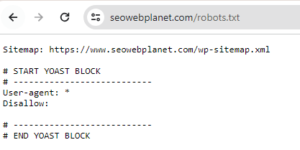The Untapped Power of Robots.txt: SEO Optimization You’re Missing

In the frantic scramble for SEO dominance, many website owners overlook a hidden gem: the robots.txt file. Often relegated to an afterthought, this unsung hero holds immense power to streamline search engine crawling, improve website efficiency, and ultimately, boost your SEO.
This blog delves into the untapped potential of robots.txt for SEO optimization. We’ll explore what it is, how it works, and most importantly, how to leverage it for maximum website visibility.
Demystifying Robots.txt: A Crash Course
Imagine a search engine crawler as a curious visitor exploring your website. Robots.txt acts as a map, guiding this visitor through the relevant sections (think: product pages, blog posts) while politely requesting them to stay out of restricted areas (think: login portals, admin dashboards).
Comprised of simple text-based instructions, robots.txt communicates with search engines using directives. Here are the two main ones:
- User-agent: This specifies which search engine crawlers (e.g., Googlebot, Bingbot) the directives apply to.
- Disallow: This instructs the crawler not to access specific URLs or directories.
For instance, the following code tells all search engines to avoid crawling the admin directory:
Disallow: /admin/

Important Note: Robots.txt doesn’t prevent search engines from indexing a page, it merely discourages crawling. Indexing decisions are based on other factors like content quality and backlinks.
Why Robots.txt Matters for SEO
Now that you understand the basics, let’s explore how robots.txt optimization can significantly enhance your website’s SEO:
- Improved Crawl Efficiency: Search engines have limited crawl budgets – the number of pages they crawl on your website during a visit. By blocking irrelevant pages (logins, duplicate content), you ensure crawlers prioritize valuable content, leading to more efficient crawling and potentially faster indexing.
- Reduced Server Load: Excessive crawling can strain your server resources. Robots.txt helps alleviate this by directing crawlers only to essential pages, minimizing unnecessary server load and improving website performance.
- Avoiding Duplicate Content Issues: Websites often have duplicate content. Robots.txt can prevent search engines from crawling these duplicates, ensuring your valuable original content gets indexed.
- Control Over Internal Search: If your website uses a complex internal search functionality with dynamic URLs, robots.txt can prevent these from being crawled, stopping them from diluting your website’s SEO power.
Robots.txt for Advanced SEO
Beyond the basic functionalities, robots.txt offers advanced features for seasoned SEO professionals:
- Crawl-delay Directive: This allows you to specify a delay between crawl requests from a particular search engine, giving your server breathing room between visits.
- Sitemap Location: You can use robots.txt to point search engines to your sitemap, a comprehensive list of your website’s URLs, further aiding efficient crawling and indexing.
Best Practices for Robots.txt SEO Optimization
While robots.txt is a powerful tool, it requires careful handling to avoid unintended consequences. Here are some best practices to ensure you’re using it effectively for SEO:
- Start Simple: If you’re new to robots.txt, begin by blocking only essential areas like logins and admin directories. Gradually expand your directives as needed.
- Test Thoroughly: Use online tools like Google’s robots.txt Tester to validate your code and ensure you’re not accidentally blocking important pages.
- Prioritize User-Agents: While the generic “*” user-agent directive works for most search engines, consider specifying directives for individual crawlers (e.g., Googlebot, Bingbot) for more granular control.
- Don’t Block Valuable Content: Remember, robots.txt discourages crawling, not indexing. Ensure you’re not accidentally preventing search engines from seeing your most valuable content.
- Keep it Updated: As your website evolves, revisit your robots.txt file regularly to ensure it reflects your current structure and content.
Conclusion: Unleash the Power of Robots.txt
Robots.txt is an underutilized SEO weapon with the potential to significantly improve your website’s search engine visibility. By understanding its functionalities and following best practices, you can leverage robots.txt to optimize crawl efficiency, avoid duplicate content issues, and ultimately, climb the SEO ladder.
So, the next time you’re optimizing your website, don’t neglect the power hidden within a simple text file. Embrace the potential of robots.txt and witness the positive impact on your website’s SEO performance.



